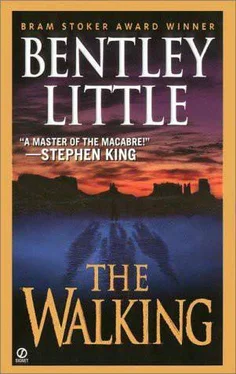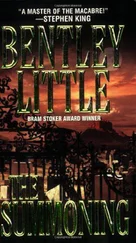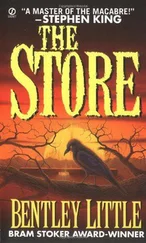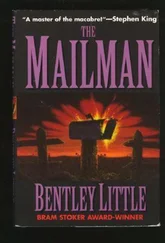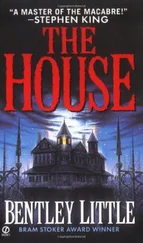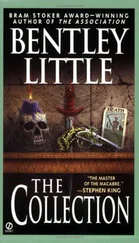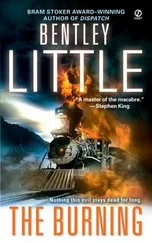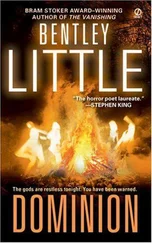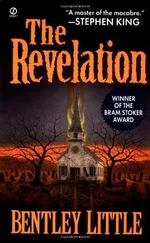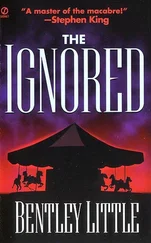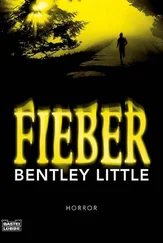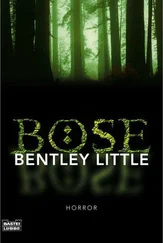The Walking
By Bentley Little
A SIGNET BOOK
SIGNET
Published by New American Library, a division of
Penguin Putnam Inc." 375 Hudson Street,
New York, New York 10014, U.S.A.
Copyright ©Bentley Little, 2000
All rights reserved
For Don Cannon, the only bookseller who matters (better late than never).
John Hawks died and kept walking.
They had not expected it, but neither did it take them totally by surprise. Garden was the first to notice, and he ran breathlessly into the kitchen to tell his father and his uncle. "I think Grampa's dead!" he called.
His father sucked in his breath. "Has he? Is he? "He's still walking." They went outside to see, standing together on the porch, letting the old screen door slam loudly against its frame behind them.
Sure enough, John Hawks was walking purposefully through the desert around the house, maneuvering through the obstacle course of saguaro and cholla and ocotillo just as he had for the past two weeks. From this vantage point, it was impossible to tell whether he was dead or not.
Robert Hawks put his arms protectively around his son's shoulders and turned toward his brother. "Cabe, check it out."
Cabe shook his head. "I ain't--"
"Check it out."
The two brothers looked at each other for a moment, then Cabe glanced away. "All right." He took a few tentative steps down the porch steps as their father disappeared behind the back of the house. He wiped his hands nervously on his jeans, then hurried across the dirt to where a slight groove had been worn into the ground.
Garden watched his uncle plant his feet right in the center of the narrow track and face the direction from which the old man would come.
He was afraid, and he could tell from the way his father's fingers gripped his shoulders that his father was afraid, too.
John Hawks had started walking the night after his fever broke. At first they'd thought that the sickness had passed. When they heard the creak of his bedsprings, heard his footsteps on the hardwood floor, they assumed that he'd gotten up and out of bed because he was all right. But when he strode straight through the kitchen and outside without so much as a word, when they saw the almost complete lack of expression on his skeletal face, the glassy stare of his pale eyes, they knew something was wrong. Robert and Cabe had run out after him, trying to find out what was going on, but the old man had begun circling around the house, bumping into the cottonwood tree, stepping through jojoba bushes, apparently oblivious to his surroundings. They had followed him around the house once, twice, three times, yelling at him, demanding his attention, but it was clear that he was not going to talk to them. They were not even sure he understood the words they screamed. The only thing they were sure of was that he was still sick.
And that, for some reason, he could not stop walking.
They hadn't tried to talk to him since, and they had not tried to stop him. There was something so terrifying about the way he endlessly circled the house, something so utterly wrong and beyond their understanding, that they had thought it best to wait it out. Robert had assigned each of them watches, and for the first couple of days they stuck faithfully to the schedule, although Cabe's nighttime vigil had since been abandoned.
They hadn't expected the old man to last long. He was sick, he was old, he was frail, and he hadn't eaten since before his fever broke.
But he'd continued to walk. Three days.
Five days. A week. Two weeks. They'd expected him to die--had hoped, had prayed, for him to die---but he had not. His condition worsened. He grew thinner, sicklier. But he continued to walk.
Now he had died.
And he continued to walk.
The old man strode back around the corner of the house toward them, and Garden felt his father's grip tighten as Cabe moved forward. His uncle put both hands out in front of him, and Garden saw him reach out and grab the old man's arms, then jump immediately away, uttering a frightened yelp.
John Hawks continued to walk.
"What was it?" Robert demanded.
"His skin's cold," Cabe said. His voice was high and frightened. "It's cold and dry."
"Grampa's dead," Garden repeated.
Cabe hurried back onto the porch and stood next to them. "What're we going to do?" he asked. He sounded as though he was about to cry.
"Exactly what we been doin'. Nuthin'
"But we gotta do something! We gotta tell someone! We can't--"
"We can't what? You got any ideas. Robert glared at his brother.
"Huhg"
Cabe didn't answer.
"Nuthin' we can do." ..... "But he's dead! Daddy's dead["
"Yeah," Robert said quietly. 'hat he is."
Garden went to bed early that night, and he lay awake in the darkness, listening. In the front room, his father and his uncle were sorting through Grampa's stuff. He'd helped them clean out the old man's room earlier, taking out the boxes of dried roots and twigs and branches, the bottles of powder the small stuffed animals, the pages of drawings, every thing. Now he stared up at the open beams of the low bedroom ceiling, at the gossamer layers of cobweb stretching across the black corners, silver white in the refracted moonlight. He could hear his father and uncle arguing, his uncle saying that they should have called on Lizabeth weeks ago to find out what was going on, his father replying that the last thing that would help them out with this problem would be calling in a witch woman
"What is all this stuff? Cabe asked. Garden heard him pick up something heavy wrapped in crinkly paper and drop it on the table.
"You know damn well what it is."
There was a pause. "But we don't know nuthin' about this."
"It's our fault. We should've listened to him."
Garden sat up in bed and pulled aside the blue cloth curtain that covered his window. There was a strong wind outside, and from the look of the sky in the nerth there was a sandstorm coming. Already he could hear the hissing rustle of small grains hitting the glass. He squinted his eyes, trying to see through the dust.
Grampa walked by, his clothes blowing in the wind billowing outward, his head moving neither to the right nor to the left but staring fixedly ahead.
Garden let the curtain fall. He could hear the wind growing stronger, its rhythms more insistent. He didn't know what was happening, but he was scared. He didn't think Grampa was going to kill him or hurt him in any way, didn't think he'd attack him or his father or his uncle, didn't think Grampa was going to do anything except walk forever in endless circles around the house. But somehow that was more frightening "What if he's there for years?" Cabe asked. "what if he
keeps doing this until there's nuthin' left of him and he's just a skeleton or something?"
Garden didn't hear his father's answer. He didn't want to hear. He pulled the blanket over his head. He fell asleep listening to the drone of their voices in. the front room as they discussed what to do.
He dreamed about skeletons walking in sandstorms.
He dreamed about Grampa.
In the morning he was gone.
As simple as that.
He had continued walking purposefully around the house until at least after midnight, when Robert and Cabe finally went to bed, impervious to the sandstorm, his torn clothes whipping around him in ragged tatters, but when the sun came up he was no longer there.
They searched their property, walked through the gullies and washes of the surrounding desert, but found no trace of John Hawks. Cabe had wanted to call it a day before noon, thankful that his dead father had disappeared, and Robert would have been inclined to follow his brother's wishes on this one, but Garden insisted that they keep looking.
Читать дальше
